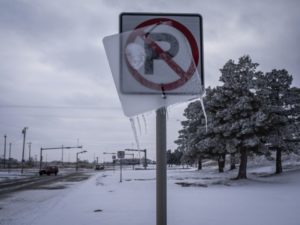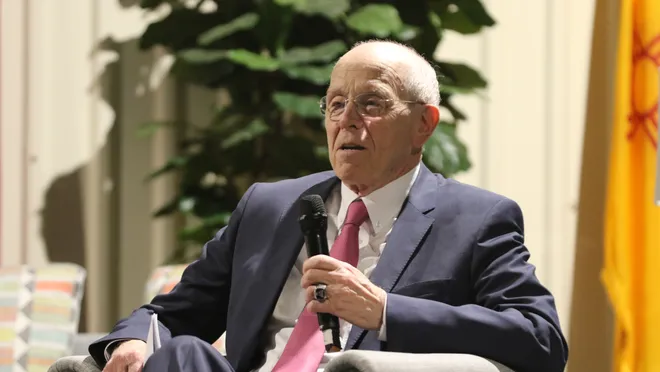
Ice coats a road sign in Midland, Texas, U.S, on Monday, Feb. 15, 2021. Photographer: Matthew Busch/Bloomberg
(Bloomberg) — The deep freeze that has forced the shutdown of U.S. refineries, oil wells and meat plants, disrupted shipments of soybeans and corn, and is still leaving more than 3 million customers without electricity could continue to keep parts of Texas in the dark for several days.
To prevent the collapse of their networks, suppliers from North Dakota to Texas implemented rolling power cuts for a second consecutive day, with outages spreading to more states including Arkansas, Louisiana and Mississippi. The operator of the Texas electric grid says it could take days for enough power plants to be up and running to restore supply. Utility CenterPoint Energy Inc. also warned residents blackouts may last for several more days.
In the Permian Basin, major producer Occidental Petroleum Corp. told customers it would be forced to curtail oil deliveries, while Chevron Corp. shut in some wells in the region. Fracking in the top U.S. shale plays has gone dark. U.S. oil production has plunged by a third.
Meanwhile, gasoline futures in New York jumped almost 5% on Tuesday as more than 20 refineries were disrupted by the polar blast. Citgo Petroleum Corp. said its Corpus Christ refinery in Texas won’t be able to deliver fuels. Wheat futures also surged as the freeze snarled grain shipments.
Amazon.com Inc. closed facilities in Arkansas, Illinois, Oklahoma, Missouri, Tennessee, Texas, Indiana and Kentucky.
Oil Prices Hold Above $60 as Crisis Spurs Rush for Fuels (4:30 a.m.)
West Texas Intermediate futures held onto gains accumulated this week trading above $60 a barrel while Brent rose for a third day. U.S. gas futures traded near the highest for three months and contracts in Europe surged.
Temperatures in Texas are now low enough to freeze oil and gas liquids in pipelines laid on the ground. LNG exports from the U.S. Gulf Coast to Europe are expected to decline. Estimated gas flows to U.S. LNG export terminals are seen 63% below the previous week and at the lowest level since early September.
North Asian spot LNG spot prices halted losses as traders weighed the impact of disruptions at U.S. export projects. The cold weather is expected to continue until the weekend when temperatures will recover to near-normal levels.
Biden’s Grid Upgrade Plan Could Get Boost from Blackouts (3 a.m.)
Energy analysts and experts said the blackouts in Texas underscore the U.S. electric system’s need for more of almost everything, from additional power lines criss-crossing the country to large-scale storage systems that can supply electricity when demand spikes or renewable generation declines.
That could give at least a rhetorical boost to President Joe Biden’s plans for a “historic investment” in the nation’s electric grid, including better transmission systems and battery storage that would make the system more resilient amid extreme weather spurred by climate change.
Texas Power Outages Becoming Fodder in Green New Deal Debate (1 a.m.)
Politicians are using the widespread power outages as fodder in the debate over whether the government should back massive investment in clean energy and infrastructure.
Texas Gov. Greg Abbott has blamed intermittent renewable power sources for the blackouts, while the state’s agriculture commissioner said on Facebook that no wind turbine should ever be built in the state again. Both are Republicans.
Democratic Congresswoman Alexandria Ocasio-Cortez fired back on Twitter, saying “the infrastructure failures in Texas are quite literally what happens when you don’t pursue a Green New Deal.”
Meanwhile one of Texas’s Senators, Ted Cruz, was reminded on Twitter of comments he made about California being “unable to perform even basic functions of civilization” during its blackouts last summer. He sheepishly responded:
“I got no defense. A blizzard strikes Texas and our state shuts down. Not good.”
Citi Sees Oil Refineries Recovering Faster Than Wells After Freeze (12 a.m.)
The Arctic freeze in the U.S. is set to cause a cumulative production loss of about 70 billion cubic feet of natural gas and 16 million barrels of oil, Citigroup analysts said in a report Tuesday. The loss could be bigger if the size and duration of disruptions exceed those during a similar event in February 2011.
While oil and gas production may rebound from the majority of wells in a week or two, it will take longer for output to recover from nearly all the wells. Meanwhile, processing facilities, including refineries and power plants, are likely to resume operations quicker. Still, the increase in energy prices caused by the disruptions could face headwinds and may remain “very volatile” over the next couple of days as shutdown of refineries and petrochemical plants boost inventories.
At Least 20 Dead in Winter Storm as Power Outages Continue (11 p.m.)
At least 20 deaths have been reported across the U.S. in connection with severe winter weather that has left millions without power, according to the Associated Press.
Three people were found dead after a tornado in North Carolina, and four others died in a Houston-area house fire after lighting a blaze in the fireplace to stay warm. Other causes of death included car crashes on icy roads and carbon monoxide poisoning.
Midwest Grid Operator Lowers Emergency Level After Ordering Blackouts (10 p.m.)
The Midcontinent Independent System Operator Inc. lowered its emergency level to a level that no longer requires rolling blackouts.
The grid had earlier asked all utilities in its southern region — most of Arkansas, Louisiana, Mississippi and Southeast Texas — to implement periodic power outages after frigid weather forced generator shut-downs at the same time demand was rising.
Texas Warns Fuel Shortages Developing in Western Half of State (9:30 p.m.)
Motor fuels are running low in some parts of Texas as winter storms and frigid weather cripple power generation, natural gas output and the oil refineries that rely on them.
The shortages have been detected along a stretch of Interstate 10 between San Antonio and El Paso, the Texas Department of Transportation said in a tweet late Tuesday.
“Parts of Texas have fuel shortages,” the tweet said. “If you must drive, top off before you hit the road.”
Houston Suburbs Tell People to Boil Water Before Drinking (8:50 p.m.)
Officials in several Houston suburbs issued so-called boil orders warning residents to purify water supplies amid deepening weather and energy crises.
Water-pressure levels in some municipal systems west and south of the fourth-largest U.S. city have fallen so low that the water is no longer safe for human consumption, according to warnings from multiple districts late Tuesday.
The boil orders came just hours after office towers in the downtown business district warned tenants that low pressure meant the water was no longer potable. Power supplies across the state have been crippled by a combination of record cold temperatures and disruptions in fuel deliveries. Water utilities in Texas rely on electric pumps to operate distribution networks.
U.S. LNG Plants Begin to Delay, Cancel Cargoes (8:45 p.m.)
The Freeport liquefied natural gas export plant in Texas has delayed and canceled planned loading of several shipments over the next few weeks as the facility curbs output in response to the deep freeze. Texas Governor Greg Abbott asked the three-train plant to dial back operations in keeping with the state’s disaster declaration.
Power disruptions at export facilities, closed ship channels and a reduction in the flow of natural gas have held back LNG tankers off the coasts of Texas and Louisiana. Crews are working to restore power to the Sempra Energy-owned Cameron LNG export terminal in Louisiana. Houston-based Cheniere Energy Inc., the top U.S. LNG exporter, also curbed production at Sabine Pass LNG in Louisiana and Corpus Christi LNG in Texas.
Gas flows to U.S. LNG export facilities have dropped to the lowest level since early-September, according to data from BloombergNEF.
Midwest Grid Operator Declares Rolling Blackouts in Southern Regions (7:45 p.m.)
The Midcontinent Independent System Operator Inc., which runs the largest power grid in the U.S. Midwest, called for rolling blackouts across its entire southern region amid generation outages and high demand. The order is scheduled until 1 a.m. on Feb. 17.
MISO operates a system that stretches along the Mississippi River region from the Canadian border to the Gulf of Mexico, taking in 15 U.S. states and the Canadian province of Manitoba.
Houston Power Outages Could Last Several Days, CenterPoint Says (6:05 p.m.)
Rolling blackouts that have paralyzed Houston and the rest of Texas may last for several more days, utility CenterPoint Energy Inc. warned residents.
With too little electricity being generated to supply all demand in the fourth-largest U.S. city, CenterPoint said in a tweet that it has no way to predict when supplies will be restored.
Canadian Gas Commands Rare Premium Over U.S. Fuel Amid Freeze (5:49 p.m.)
A deep freeze that’s sent Texas power prices surging and curtailed millions of barrels of oil production is serving as a short-term boon for Canada, which is fetching a rare premium for its natural gas.
The country’s benchmark AECO gas price traded at a 27% premium to its U.S. equivalent on Tuesday, just days after touching a 7-year high of $5.28 per million British thermal units, data compiled by Bloomberg show. Canadian gas usually sells at a discount to American supplies because of its distance from major population and manufacturing centers, among other reasons.
U.S. Oil Output Plunges by a Third as Freeze Slams Permian (5:32 p.m.)
Total U.S. oil production has plunged by nearly a third as an unprecedented cold blast freezes well operations across the central U.S., according to traders and industry executives with direct knowledge of the operations.
Crude output has now fallen by about 3.5 million barrels a day or more nationwide, they said, asking not to be identified because the information isn’t public. Before the cold snap, the U.S. was pumping about 11 million barrels a day, according to last government data. Production in the Texas’s Permian Basin alone — America’s biggest oil field — has plummeted by as much as 65%.
Operations in Texas have stumbled because temperatures are low enough to freeze oil and gas liquids at the well head and in pipelines that are laid on the ground, as opposed to under the surface as practiced in more northerly oil regions. The big question now is how quickly temperatures return to normal.
It Could Take Several Days to Restore Power in Texas (5:20 p.m.)
The operator of the Texas electric grid no longer expects all service to be restored in the state by Tuesday night, saying it could take days for enough power plants to be up and running.
One of the chief hurdles is that there isn’t enough natural gas flowing to fuel plants, Bill Magness, chief executive officer of the Electric Reliability Council of Texas, said in a briefing. He expects “significant progress” in the next several days but warned more power plants could still trip offline.
“We are seeing progress on restoration of the system,” Magness said. “There could be setbacks”
Earlier Tuesday, grid officials said they expected all power to be restored by the evening.




0 Comments